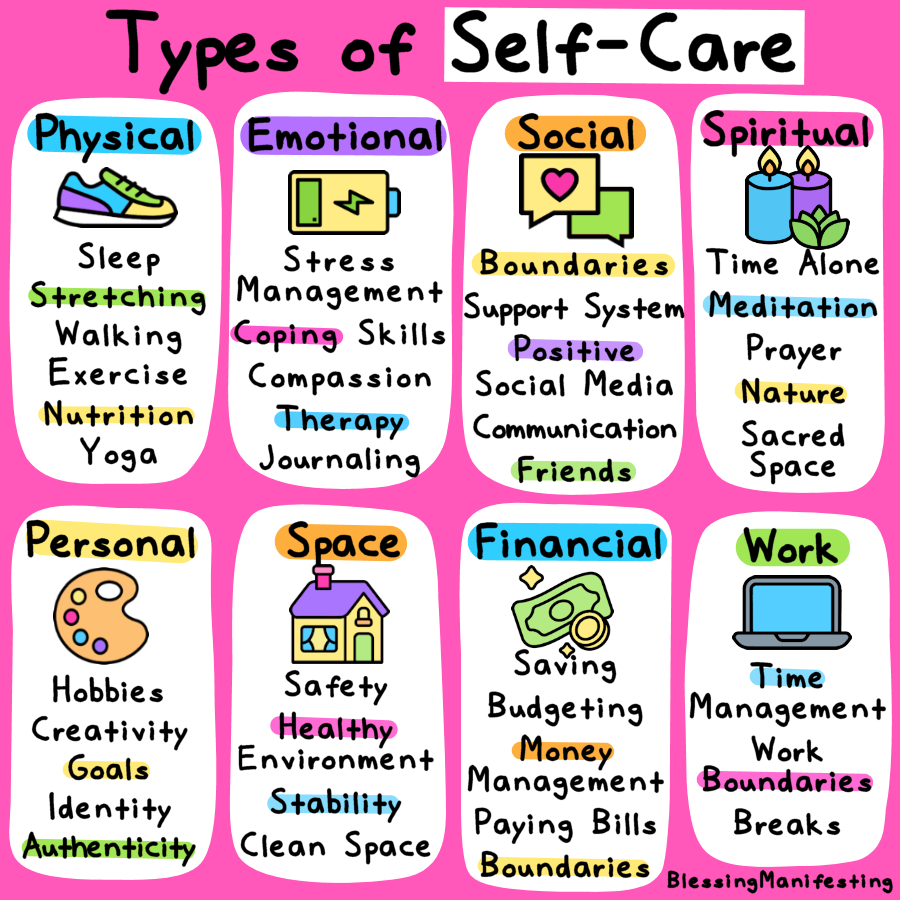What is self-care?
Self-care means taking the time to take care of yourself so that you can be physically and mentally healthy which can then enable you to care, love and give compassion to yourself and others. Self-care looks different for each person. It could be maintaining a good work and personal balance or prioritising yourself and your mental health.
Different types of self-care
There are 8 different types of self-care.
- Physical: Activities that improve your physical wellbeing and health.
- Emotional: Activities that allow you to express your feelings and relax.
- Spiritual: Activities that allow you to explore and express your beliefs, morals and values. It helps you to deepen your connection with yourself and a higher power.
- Personal: Activities allow you to learn more about yourself and goals. As well as explore your hobbies and interests.
- Space: Is fulfilling your responsibilities and taking care of your physical space and environment.
- Social: Nurturing your relationships with a partner, family and friends and setting boundaries.
- Financial: Making smart decisions with money and working towards your financial goals.
- Work: Managing your time well and having a good work life balance.

Why is self-care important?
- Slowing down and practicing self-care can make you more productive
- Slowing down could be saying no and taking on less commitments, making time to meditate and exercise or just taking a deep breath before attending a meeting.
- Self-care can help you to deal with the daily stressors of life
- Self-care will help boost your immune system and energy
- Activities such as taking vitamins, getting rest and mindfulness all activate your Parasympathetic Nervous System which helps your body to rest and restore.
- Practicing self-care can help you become more compassionate to yourself
- Discover more about yourself
- Self-care allows you to reflect on what you are passionate about and enjoy doing, what your goals are and what is important to you which allows you to reconnect with yourself.
- You will have more to give others
- Self-care is not selfish and if you take care of yourself, you have more energy to help others.
- It also can help you to improve your physical and mental health as well as your overall well-being.
- Engaging in a self-care routine has been clinically proven to reduce anxiety, depression and reduce stress
- From a physical health perspective self-care may reduce your risk of heart disease, strokes, and cancer.
Self- care activities
- Read
- Journal
- Meditate
- Go on walks
- Clean your environment and physical space
- Turn to natural ingredients to improve your diet
- Drink water
- Set boundaries
- Learn a new skill
- Get enough sleep
- Take regular breaks
- Practice mindfulness
Tips for self-care
- Make a self-care checklist
- Take intentional breaks
- Build a self-care routine but adding it to existing habits such as 10 minutes of meditation before eating breakfast.
- Self-care doesn’t have to be complicated. Start small by doing simple acts of self care such as turning off your phone for an hour.
- Try to schedule at least 15 minutes each day for self-care.
- Hold yourself accountable and make self-care a priority.
- Identify specific activities that work for specific moods. Take time each day to notice how you are feeling and pick a self-care activity that works for you.
